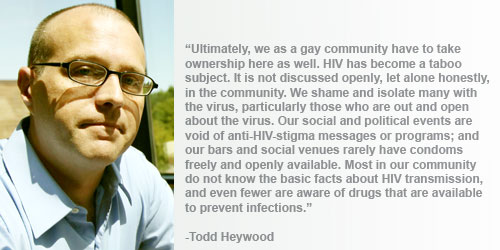
We have a crisis in the gay/bi/men who have sex with men community. This crisis is particularly clear among our youth, 13-24. HIV is not gone, and in fact has become a generational legacy. While most age groups in the U.S. are leveling off in the number of new infections, our youth continue to bear the brunt of the epidemic.
The CDC says that every month in the U.S., 1,000 youth 13-24 are diagnosed with HIV. Of these, 78 percent are gay/bi/men who have sex with men. Worse still, more youth are infected, but don't know it. The CDC estimates 59.5 percent of youth 13-24 who are infected are unaware of their status.
Add to this that a 2010 study by the CDC found that 1 in 5 gay/bi/men who have sex with men in 21 U.S. cities (including Detroit) is infected with HIV. Of those, the study reported, 44 percent do not know they are infected.
Over 52 percent of HIV infections according to Michigan Department of Community Health stats are in gay/ bi/men who have sex with men.
So what is causing this crisis? Nobody knows for sure. According to the CDC, 86 percent of young men who had sex only with women reported having learned about HIV in school, while only slightly more than 74 percent of MSM reported learning about HIV in school. It is unclear what role abstinence only sex education is playing in this, particularly in light of studies which misinform youth about transmission of HIV as well as critical analysis of such programs showing they are heterosexist in nature.
While all of this is terrifying and in some ways disappointing, it is not surprising in the big picture of HIV. Sure, government policy has something to do with this. So does the failure of our educational system.
But ultimately, we as a gay community have to take ownership here as well. HIV has become a taboo subject. It is not discussed openly, let alone honestly, in the community. We shame and isolate many with the virus, particularly those who are out and open about the virus. Our social and political events are void of anti-HIV-stigma messages or programs; and our bars and social venues rarely have condoms freely and openly available. Most in our community do not know the basic facts about HIV transmission, and even fewer are aware of drugs that are available to prevent infections. Many in the community have surrendered their sexual health to the faulty expectation of disclosure – and in fact many actually reject those who are positive for being honest.
But here on the cusp of 2013, we have a real opportunity to challenge and change this. It will not be easy and it will require a community change. Here's how we can overcome HIV in the gay/bi/MSM community in 2013:
1. Learn the facts. HIV is an incredibly difficult virus to transmit. The CDC says the highest probability for sexual transmission is .5 percent for the bottom in one episode of unprotected anal intercourse. Most Americans – and that includes our community – think the probability is between 20 and 90 percent per sex act. A person living with HIV who is on successful anti-retroviral treatment (meaning they have an undetectable viral load) reduces that already low probability by 96 percent more. And using a condom reduces that by 80 percent. Intervention after an exposure with antiretroviral medications (n-PEP) can reduce infection by 78 percent if initiated within 72 hours of exposure (such as unprotected sex). The daily use of the antiretroviral medication Truvada can reduce transmission by up 90 percent (in those who actually took the drug daily).
2. Reliance on disclosure is not a prevention method. With 44 percent of the community members infected with HIV not aware of their status, reliance on disclosure is futile. Those who do not know they are infected are 3.5 times more likely to transmit their infection and studies place responsibility for new infections from those who are unaware of their infection at between 55 and 90 percent of the new infections in the U.S. Get tested and presume anyone you have sex with is HIV positive, and behave accordingly.
3. Demand our organizations accept responsibility for addressing the HIV crisis in our community. Marriage equality is lovely, but if the next generation is decimated by a preventable epidemic, then marriage equality won't mean diddley-squat. Our organizations and institutions must put HIV front and center in the political and social agenda. Leaving to overburdened and underfunded AIDS Service Organizations is irresponsible and a failure in leadership.
4. Discuss HIV openly everywhere. This means we have to start talking about the real crisis here today. This means we need to discuss stigmatizing language and actions from those who think they are uninfected. This means we need to discuss the import of barebacking to the gay/bi/MSM community in a nonjudgmental way. This means we need to not blame those who are becoming infected and support those who are uninfected.
This requires a paradigm shift in the thinking of a community that has made HIV and all the issues associated taboo subjects. But we cannot afford business as usual. Business as usual means more and more youth being infected with a life altering viral infection. Business as usual means isolation and abuse of those living with the virus, driving the disease underground. Business as usual means shifting responsibility for our sexual health onto another person's shoulders. Simply put, business as usual means letting the virus take many more of our community. 2013 can change this. But only if you step up to the plate to help make the change.
http://www.cdc.gov/hiv/law/transmission.htm. For more information about all things Michigan on HIV, go to
http://www.michigan.gov/mdch/0,4612,7-132-2940_2955_2982—,00.html.>










